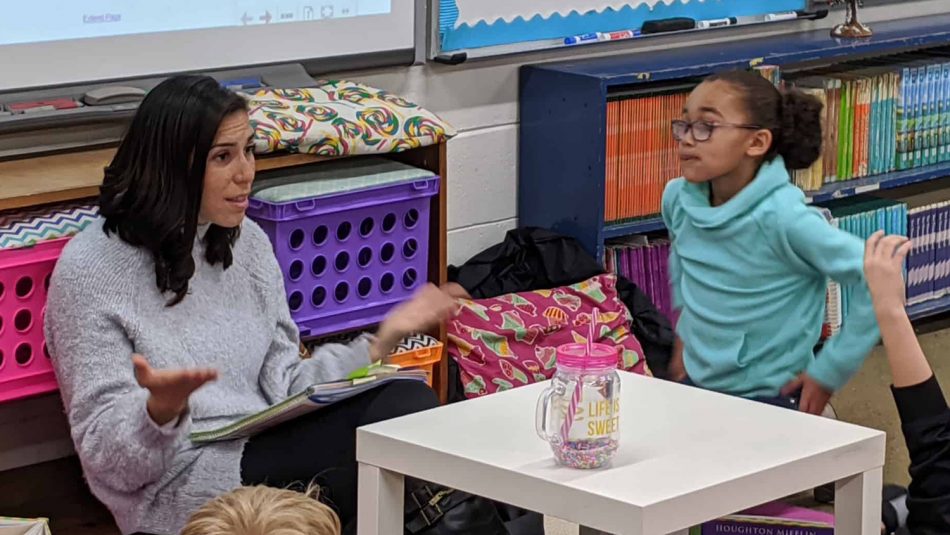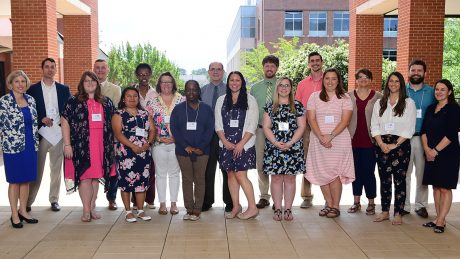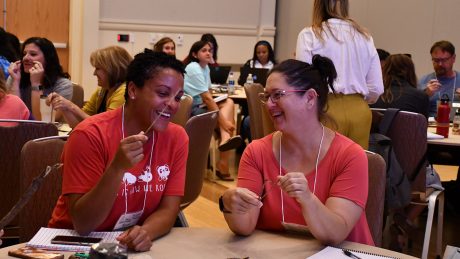How the NC State College of Education Helps In-Service Teachers Across North Carolina Succeed
The NC State College of Education graduates educators who rate among the best in statewide performance measures. But our work to prepare extraordinary educators extends beyond pre-service teachers. From professional development opportunities to advanced degree programs for in-service teachers across North Carolina, programs and partnerships with public school districts are working to ensure that all students receive a high-quality education.
Here are some of the ways the NC State College of Education is impacting in-service teachers throughout North Carolina.

Anthony Swaringen, an English teacher at Carrboro High School, had spent several years co-teaching with an English as a Second Language instructor when he decided that he wanted to do more to support his students who were English language learners.
When he learned that Chapel Hill-Carrboro City Schools had partnered with the NC State College of Education to offer an add-on licensure in K-12 English as a Second Language exclusively for teachers in the district, Swaringen was eager to sign up.
“I realized that I had large gaps in my knowledge about language acquisition, especially around reading and writing, so when this opportunity arose, I was very excited,” he said.
Swaringen is one of thousands of in-service teachers in North Carolina benefitting from partnerships the College of Education have formed with public school districts to provide continuing support, professional development and credentials to teachers already in the classroom.
“We are delighted with our partnership with NC State. They have been flexible, responsive and willing to customize pathways that lead to dual certification in high impact areas. This innovative professional development ensures our teachers are prepared to effectively support all learners,” said Chapel Hill-Carrboro City Schools Assistant Superintendent Jessica O’Donovan.
The College of Education’s partnerships with school districts throughout the state help K-12 educators become experts in subjects ranging from early literacy to mathematics education, earn licensure from the comfort of their own home, and travel the world to learn better ways to visualize cultural representation in the classroom.
“It’s really important to us that public school districts see us as a resource and a place where they can find new and creative ideas for some of the problems they are trying to address,” said Dennis Davis, Ph.D., an associate professor of literacy education. “It’s also important that we see districts as genuine partners in trying to figure out solutions to problems that are specific to those districts.”
Using a $575,183 grant from the Mebane Charitable Foundation, Davis worked with Yadkin County Schools to establish the Yadkin Wolfpack Literacy Partnership. Twenty elementary and middle school teachers will join the cohort-based program and earn a Master of Education degree that will enable them to become literacy leaders in the district and improve reading proficiency in Yadkin County.
The newly formed Yadkin Wolfpack Literacy Partnership joins several other NC State College of Education programs that are providing North Carolina teachers with an opportunity to enhance their skills while practicing what they learn in their classrooms on a regular basis.
Helping Teachers Stay in the Classroom
The Yadkin Wolfpack Literacy Partnership drew some of its inspiration from the College of Education’s Wolfpack WORKS literacy initiative. Wolfpack WORKS, supported by more than $18 million in grant funding from the N.C. Department of Public Instruction, is an ongoing effort to provide literacy-specific induction support to first-, second- and third-year teachers in 16 high-need, public school districts in North Carolina
Wolfpack WORKS is designed around 10 evidence-based literacy practices. It incorporates blended professional development and literacy-specific coaching and resources that beginning, K-2, classroom teachers need to implement effective literacy instruction in their classrooms.
“Our goal is to help these teachers transition into the profession and learn to apply in classroom settings what they have learned in their teacher preparation programs as well as to help support the nearly half of beginning teachers we are working with who had no teacher preparation prior to entering the classroom,” said Ann Harrington, Ph.D., Wolfpack WORKS’ co-principal investigator and teaching associate professor of reading education.
In the program’s first year, survey data showed that 97% of participating teachers reported a desire to remain in the classroom and 88% of those said they planned to continue teaching in their current district.
These statistics are important because, as the most recent data available shows (the State of the Teaching Profession in North Carolina report from 2016-17), the attrition rate for beginning teachers is significantly higher than that of veteran teachers and beginning teachers account for about 30% of all teachers who separate from employment with public schools in the state.
“In addition to improving early literacy outcomes, addressing the needs of beginning teachers and supporting their classroom literacy instruction could potentially reduce attrition and recoup the high investment school districts make in recruiting and supporting new teachers,” Harrington added.
Keeping new teachers in the classroom is crucial as North Carolina faces a critical shortage of teachers even as schools have experienced increased K-12 student enrollment in recent years. The NC State College of Education is addressing this issue by working with in-service teachers and school districts to help educators gain the credentials and confidence they need to continue teaching.
Pathway to Practice, a joint program with UNC-Chapel Hill’s School of Education, enables residency licensed teachers — those who have bachelor’s degrees and content experience but did not complete a traditional teacher preparation program — to earn their full licensure through a 100% online, state-approved Educator Preparation Program.
Residency licensed teachers tend to leave the profession at a rate that is 79% higher than traditionally licensed teachers. Pathway to Practice provides these residency licensed teachers not only with the credentials needed to become fully licensed, but the skills needed to provide a high-quality education for students.
Nick Musgrave, lead math teacher at Thomasville Middle School, said that his participation in the program radically changed his approach to teaching by helping him develop stronger classroom management skills and create a classroom mission statement that made his students feel like they were part of a team.
“Most of the ways Pathway to Practice has changed my classroom and changed me as a teacher revolve around procedural practices, classroom management and class culture,” Musgrave said. “The passion and relationship building have always been there for me, that’s why I think I was called to teach. I just needed some tools to help me and I got them from Pathway to Practice.”
Fourteen teachers, including Musgrave, have already earned their full teacher licensures through the program and 125 more, representing 50 school districts, are currently enrolled.

Providing Teachers with Advanced Degrees, Credentials
Karen Hollebrands, Ph.D., Alumni Distinguished Undergraduate Professor of STEM education, is also working to make sure that qualified teachers remain in the classroom, even as they work to advance their careers.

To help in-service teachers gain new skills and become leaders in mathematics instruction, she developed the North Carolina High School Master Teacher Fellows Program. Funded by a three-year, $1.8 million grant from the National Science Foundation, the program will help strengthen the leadership skills and instructional practices of 19 math teachers who impact more than 15,000 students in six rural and semi-rural public school districts.
Over the course of five years, the program will provide teachers with an opportunity to earn an online graduate certificate in mathematics teaching or complete a master’s program, as well as work collaboratively to apply for National Board Certification.
“The purpose of the North Carolina High School Master Teacher Fellows program is to develop teacher leaders by supporting them as they pursue advanced degrees, certificates and National Board Certification,” Hollebrands said. “The educational opportunities and certification can help experienced teachers advance in their career.”
In-service teachers from across the state also have opportunities to improve their practice and earn free Continuing Education Units (CEUs) to renew their licensure as well as credentials through Massive Online Open Courses for Educators (MOOC-Ed) offered by the Friday Institute for Educational Innovation.
MOOC-Ed professional learning courses provide educators with peer support and on-the-job application opportunities as they learn materials related to a variety of subject areas. Educators can learn the material at their own pace by engaging in course material that includes core resources and supplemental materials around a specific topic while allowing for personalization and flexibility.
I think we’re able to really understand the needs of teachers because we’re in touch with people in the schools and the districts every single day.
Mary Ann Wolf, Ph.D.,Director of Digital Learning and Teaching at the Friday Institute for Educational Innovation
The Friday Institute offers nearly a dozen MOOC-Ed courses that address topics such as teaching foundational reading skills, teaching mathematics with technology, fraction foundations and problem solving in the digital age. As many as six MOOC-Ed courses are offered each semester and the courses have cumulatively served 44,000 teachers worldwide.
As part of this MOOC-Ed initiative, the Friday Institute offers micro-credentials in learning differences and social-emotional learning for educators through a partnership with the Oak Foundation. The program has served teachers in all 115 school districts in North Carolina and reached about 11,000 educators worldwide.
“I think the MOOC-Ed courses offer teachers a flexible way to learn something that’s important to them and we really guide them,” said Mary Ann Wolf, Ph.D., director of digital learning and teaching at the Friday Institute. “We see that teachers are far more successful with implementation with the microcredential because it really pushes them to try what they’ve learned in their classroom, and then they get feedback from us to guide their practice.”
Expanding Professional Development Beyond District Boundaries
Distance and busy schedules often make it difficult for educators to connect with and learn from their peers in other districts. The Friday Institute, in partnership with The Innovation Project, established the Early Learning Network to bring together participants from about 20 North Carolina public schools in each twice annual cohort.
Principals and a select team of teachers from each district meet several times at the Friday Institute to help tackle the need to redesign learning environments to address the early learning needs of vulnerable children.
Additionally, the Friday Institute’s North Carolina Digital Leaders Coaching Network has trained about 800 coaches from 100 of North Carolina’s 115 public school districts to aid them in making data-relevant decisions and developing coaching action plans to support teachers in improving their instruction.
“Educators want to continue learning, so providing these meaningful opportunities that connect with their experiences and allow them to work on challenges and personalize solutions has been very important for the teachers and their students,” Wolf said.

Teachers from different districts throughout the Triangle also have a chance to undergo professional development together at the annual NC State and Triangle Math Alliance Summit. The event — hosted each summer in partnership public schools in Chapel Hill and Wake, Durham, Orange and Johnston counties — features more than 50 breakout sessions that enable educators to engage in discussion and listen to presenters from NC State, local public schools, the N.C. Department of Public Instruction and other UNC System universities.
The summit is the culmination of a year-long partnership between Associate Dean for Research and Innovation Paola Sztajn, Ph.D., and district K-12 math coordinators who meet monthly to plan for the event and discuss the state of mathematics education in North Carolina.
The Math Summit, which saw 600 elementary and secondary educators participate in 2019, gives teachers an opportunity to stay up-to-date on best practices for teaching mathematics as well as to learn from their peers in other districts.
“The ongoing partnership with school districts in the Triangle allows us to work collaboratively with the math leadership in our area throughout the school year. Our work together culminates with the design of the Math Summit, which is sponsored by SAS and attended by several hundred teachers each summer,” said Sztajn. “This professional development event supports teachers’ implementation of high-quality, evidence-based mathematics instruction and gives teachers an opportunity to learn from fellow educators whom they would not typically have an opportunity to interact with during the school year.”
Since 2011, the College of Education has also helped in-service teachers expand their skill set outside of North Carolina through the Cultural Investigation and Digital Representation for Educators (CIDRE) program.

Over the past nine years, this professional development program has used a grant from the Triangle Community Foundation’s Borchardt Fund to enable 128 teachers from Wake, Durham, Orange and Chatham counties to travel to Europe, where they learn about infusing writing and technology into different cultural experiences and visualizing cultural representations in the classroom.
“Professional development for in-service teachers is so important because the teachers are in a position where they’ve had professional experience — they have very specific questions and they know their strengths and needs,” said Angela Wiseman, Ph.D., associate professor of literacy education and a faculty leader with CIDRE. “Providing in-service teachers with the opportunity to travel internationally can be an important component of their professional development. There is so much we can all learn about history, culture and people from visiting a different country.”
Continuing to Build Partnerships
Anthony Swaringen, the Carrboro High School English teacher, completed the coursework for licensure in K-12 English as a Second Language in December 2019, and plans to take the PRAXIS exam in the subject in early 2020.
It’s important for all teachers to be lifelong learners in order for them to be the best at what they’re doing and to meet the needs of students in their classroom.
John K. Lee, Ph.D., Professor of Social Studies Education and Head of Department of Teacher Education and Learning Sciences
As he completed the coursework, he said that he began to recognize opportunities to fill gaps in his students’ written and oral language skills that he hadn’t noticed before participating in the licensure program. The program has also equipped him with instructional strategies to address issues faced even by native-speakers in his classroom, he said
“In each of my classes, I have had weekly opportunities to talk with teachers of all different levels, and some of the participants aren’t classroom teachers at all, so it has provided space to explore how the application of the knowledge can be modified depending on the teaching context,” he said.
As the K-12 English as a Second Language add-on licensure program wraps up, John Lee, Ph.D., Teacher Education and Learning Sciences department head, and Chapel Hill-Carrboro City Schools administrators are rolling out a similar program to allow teachers in the district to earn an add-on licensure in special education beginning in May 2020.
Lee said that these ongoing partnerships are helping schools develop the talent they need to provide high-quality instruction while allowing NC State to fulfill its mission as a land-grant university.
“From the district’s perspective, it addresses these critically high needs that they have for teacher expertise to meet the needs of the students in their schools,” he said. “From our standpoint, it helps us deliver on our mission to provide the school districts in North Carolina with an opportunity to enhance the work that they do and to partner with those school districts in a meaningful and deep manner.”
